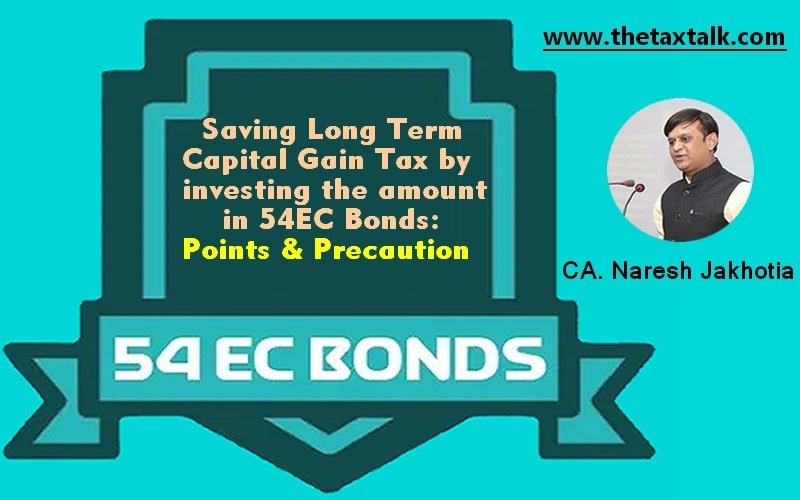![]()
Saving Long Term Capital Gain Tax by investing the amount in 54EC Bonds:
Points & Precaution
One of the common modes of saving tax on Long Term Capital Gain (LTCG) arising from sale of Land or Building or Both is by investing the amount in the specified bonds issued by National Highway Authority of India (NHAI) or Rural Electrification Corporation (REC). Exemption against LTCG is available u/s 54EC of the Income Tax Act-1961.
About Section 54EC:
-
Section 54EC provides that any LTCG earned from sale of any long term assets will be exempt from tax if the amount is invested within a period of 6 months from the date of transfer of assets in the specified bonds issued by NHAI/REC.
-
It is available to all the categories of taxpayers whether it is individual, HUF, Companies, firm etc.
-
There is a ceiling of Rs. 50 Lakh for exemption u/s 54EC which means that the amount exceeding Rs. 50 Lakh can never be the part of LTCG exemption u/s 54EC. The question may arise as to whether the person can invest Rs. 50 Lakh in two financial years so as to get the benefit of deduction of Rs. 1 Cr. To illustrate, a person has earned a LTCG of Rs. 1 Cr on 01/01/22. Can such taxpayers invest the amount of Rs. 50 Lakh before 31/03/22 and Rs. 50 Lakhs in between 01/04/22 to 30/09/22? The answer is No. Against LTCG of one year, maximum investment of Rs. 50 Lakhs can only be done by the taxpayers.
-
Investment has to be done within 6 months from the date of transfer. In short, investment should be done after the property is transferred and should not be done from the advance payment received against agreement to sale before actual transfer of the property.
-
The restriction of Rs. 50 Lakh is there year-wise and not assets-wise. For example, Mr. Smart has transferred 3 properties in the FY 2021-22 and has earned LTCG of Rs. 25 Lakh each from these properties. In such a case, his exemption u/s 54EC cannot exceed Rs. 50 Lakh for all the 3 properties taken together. Ideally, if taxpayers want to avail exemption U/s 54EC by investing the amount in Specified bonds then taxpayers can plan the sale of the property in such a way that the cap of Rs. 50 Lakh per financial year is used optimally.
-
Exemption is available only if the LTCG is arising from sale of Land or Building or both. Exemption is not available if the capital gain arises from transfer of any other assets like sale of gold, gems, tenancy rights, Shares, etc.
-
The bonds are fully secured and it is presently offering interest rate of around @ 5%, payable annually.
-
Interest is taxable and not exempt from tax.
-
Exemption u/s 54EC is available on the basis of LTCG & not with reference to “Net Sale Consideration” which means that entire net sale consideration need not be invested for claiming exemption u/s 54EC. For example, Mr. Smart has sold his land for Rs. 1.50 Cr and has earned an LTCG of Rs. 35 Lakh. In such a case, he can save full LTCG tax by investing just Rs. 35 Lakh in the specified bonds U/s 54EC.
-
It may be noted that all LTCG in general is taxable at a special rate of 20%. With education cess of 4%, the effective rate turns out to be 20.80%
-
Specified bonds issued u/s 54EC have a lock-in period of 5 years. Earlier, the lock in period was 3 years which has now been extended to 5 years by the Finance Act- 2018 w.e.f. 01/04/2018.

